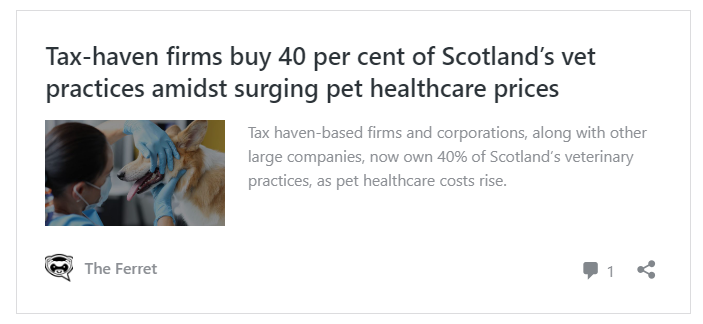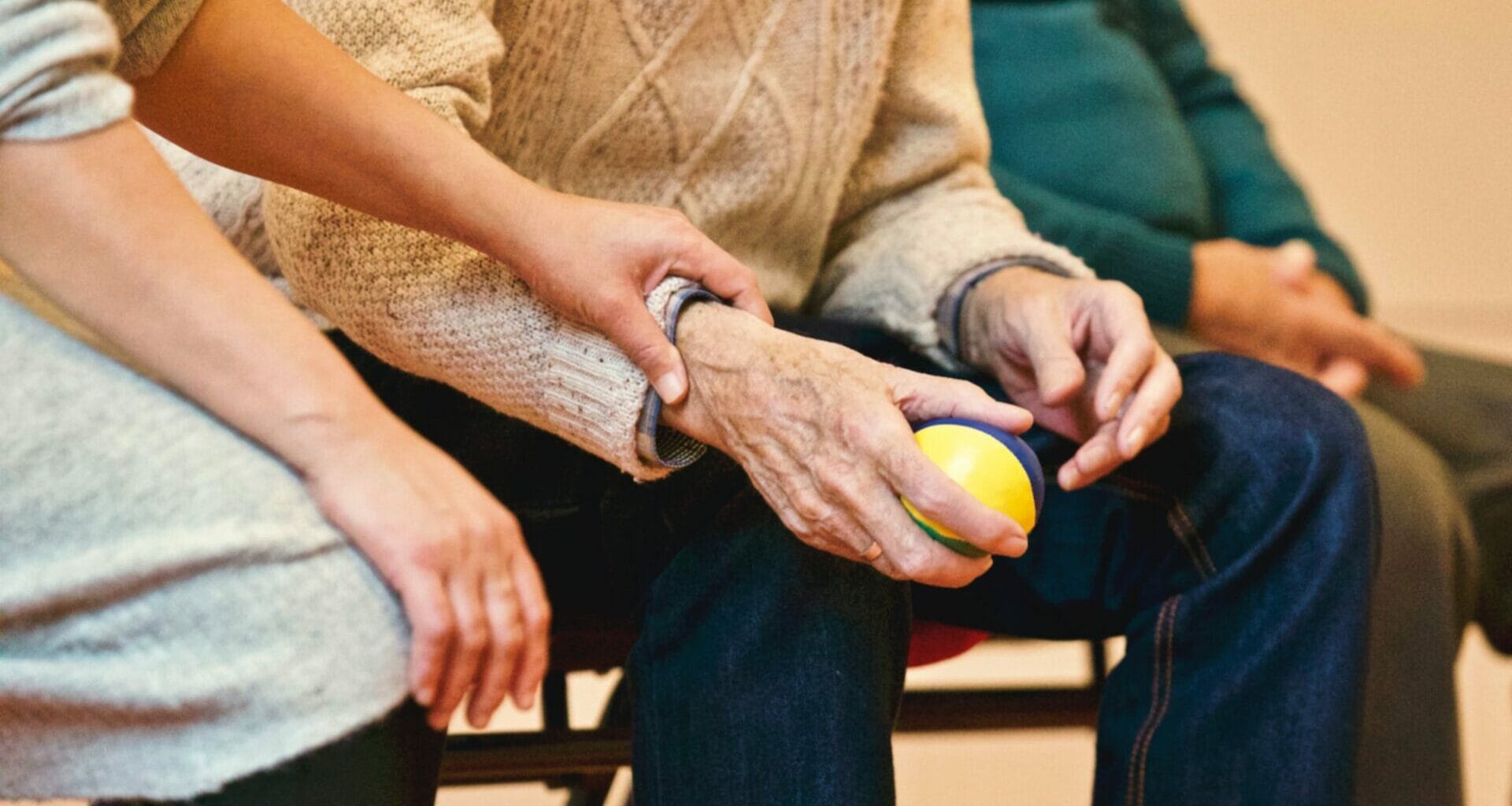Care homes chains operating in Scotland have had hundreds of complaints upheld by inspectors in recent years, The Ferret can reveal.
Data we obtained via freedom of information from the Care Inspectorate shows that 7,086 alleged issues at care homes were raised between April 2020 and March 2023 – 706 were upheld as legitimate complaints and enforcement action was taken 32 times.
Issues have included poor “health, welfare and safety”, filthy living conditions, residents going weeks without being washed, “unsafe” food and drink intake, missed hospital appointments, and mismanagement of medicines, local reports show. Some incidents led to injuries and even death.
Private firms had nearly triple the rate of complaints per care home compared to the public or third sector. The biggest union representing care workers is among those that argue a publicly owned care sector would stop care homes being treated as “assets to be exploited” and poor conditions for service users and workers.

Care home chains said they took every complaint seriously and worked hard to improve their operations. But they argued a lack of public funding and a staff exodus was leading to closures and “compromising resident safety”.
Of the five chains with the highest numbers of complaints, four are ultimately owned in tax havens – the ownership location of the fifth, which has given £38,000 to the Conservative Party, is unclear.
Separate data released by Public Health Scotland in November shows the overall number of care homes dropped by nearly a fifth over the last decade, with care mostly delivered by the private sector.
The estimated number of residents decreased by a third in the voluntary or non-profit sector, fell by a fifth in the public sector, and increased slightly in the private sector.
Some private chains are yielding multi-million-pound profits and have paid out millions to bosses, whose salaries have reportedly doubled in recent years and are worth up to 120 times that of their lowest paid workers.
There has been a recent exodus of care staff seeking better wages and working conditions. Some chains have previously resisted minimum wage rises, yet received tens of millions in public sector fees, including for poor-rated care homes.
Others are loss-making, having made “casino-style” bets by taking on high levels of debt and should not receive taxpayer bailouts, according to a 2016 university study.
The care home chains with the most complaints
Balhousie Care
With 44 complaints, Balhousie had the highest number of issues per home on average (2.3), and accounted for nearly a third of enforcement actions (10). Inspectors have found issues including “unsafe” food and drink intake, missed hospital appointments, poor management of medication, and failures to recognise and alleviate pain.
Balhousie’s care and support measures during Covid-19 in Crieff were branded ‘weak’ by inspectors. One Aberdeenshire site was reportedly one of Scotland’s worst-performing facilities before a public takeover in April.
Balhousie’s parent firm, Olive Tree Foundation, is ultimately owned via shares by Zamoli Ventures AG, which is incorporated in the tiny European tax haven of Liechtenstein. In 2022, Balhousie reported profits of £2.8m, compared to £5.2m the previous year.
The firm stressed that a “staffing crisis” presents “a very real, existential threat to the everyday running of care homes”, particularly in rural areas.
Inspectors’ reports had largely attributed issues to staff shortages but commended “the dedication of our teams, persevering under these pressures,” said a Balhousie spokesperson. The firm has been under new management for the last year and has “worked tirelessly” to boost staff numbers and care standards.
Advinia Care Homes
Advinia had 25 complaints upheld at its 11 homes, four of which resulted in enforcement action. Complaints in Renfrewshire and South Lanarkshire included filthy rooms, residents allegedly going weeks without being washed, compromised “health, welfare and safety”, and diets which did not “reduce the risk of choking”.
Families this year spoke out against residents being charged £140 – on top of existing £700 monthly fees – to participate in activities like arts and crafts. Advinia also presided over some of the largest death tolls during the pandemic.
In Rutherglen, inspectors reported poor cleanliness and infection prevention and control. A Glasgow whistleblower claimed residents were admitted to hospital suffering from dehydration and gangrene.
The company, which has given £38,000 to the Tories, is ultimately controlled by the Paraman Trust Settlement, which has almost no public information. Advinia said the trust is registered with HMRC while its donations to the Tories did not represent “a significant sum” and are “irrelevant to the bigger picture”.
A Tory party spokesperson said donations “are properly and transparently declared to the Electoral Commission, openly published by them, and comply fully with the law.”
Some 80 per cent of Advinia’s revenues come from local authorities and clinical commissioning groups, according to its latest accounts, which reported £4.1m in profits. In January, Advinia’s head called on the Scottish Government to up public financial support.
An Advinia spokesperson claimed staff were leaving the sector due to a lack of government funding. “One care home per week is closing down in Scotland due to the low fees being paid which is compromising resident safety,” they said.

HC-One
With 55 care homes, HC-One had the most complaints upheld (109), and four enforcement actions.
Incidents include a Fife resident with dementia dying after eating cleaning tablets, and a Clackmannanshire resident choking to death on food they were erroneously given.
Hundreds of residents died from suspected or confirmed cases of Covid-19 at its care homes. Whistleblowers alleged people were allowed to mingle with symptomatic people, for whom treatment was not sought, and air freshener was used as disinfectant.
At the onset of the pandemic, HC-One reportedly asked councils for financial support. It paid out at least £4.8m to its owners the previous year.
HC-One’s latest accounts list the company’s ultimate owner as Skyfall GP, which is registered in the tax haven of the Cayman Islands. In 2020, The Ferret found that HC-One rented care homes from a Jersey company largely owned by the Chinese government.
HC-One last year filed operating losses of over £14m for the second year in a row. The company did not respond to a request to comment.
Barchester Healthcare
Barchester had 29 complaints across its 17 Scottish care homes. In England, complaints from concerned family members include a resident with dementia with maggots living in her hand, and a resident left with soiled clothing and feet. In May, inspectors reported poor staff training and failures to ensure resident health and safety at one site.
Barchester is owned by three billionaires via Grove Ltd, which is incorporated in the tax haven of Jersey. Barchester saw operating profits rise to £32m last year.
In 2021, it announced an increase in annual fees by thousands of pounds to pay for higher staff wages, utility bills and rent. In 2022, we reported that Barchester paid some staff just above minimum wage, but paid its director £2.27m in 2020.
A Barchester spokesperson said of the Care Inspectorate data: “The figures presented are not 100 per cent correct.”
Some 94 per cent of Barchester homes in Scotland “are rated between excellent or good by the Care Inspectorate – considerably higher than other similar care providers,” they argued.
Four Seasons Health Care Group
Four Seasons attracted 22 complaints and two enforcement actions across 20 homes. Previous issues include residents being struck in Aberdeen in 2013 and facing neglect in Livingston in 2014.
In 2022, mould, soiled mattresses, “disconnected” management and failures to prioritise residents’ health and dignity were found in Irvine. Edinburgh council faced costs of more than £1m to get two former Four Seasons care homes up to Care Inspectorate standards after they were returned to the public sector.
The firm is ultimately owned by Guernsey-based Boron Holdings – via the Cayman Islands – according to its latest accounts.
A Four Seasons spokesperson said: “We always investigate any complaints raised with us and work openly and transparently with the Care Inspectorate. Where complaints are upheld, we take swift action. The care and wellbeing of our residents is our first priority.”
It’s time to shape a care system that puts people first, free from negligence and run in public hands.
Johnbosco Nwogbo, We Own It
Calls for publicly-owned care sector
The Scottish Pensioners’ Forum’s chairperson, Rose Jackson, argued public ownership of the care sector was “the only way forward”, claiming corporations view care homes as “assets to be exploited and have absolutely no shame in doing so”.
Johnbosco Nwogbo, lead campaigner at public ownership campaign group We Own It, said:
“The extent of the negligence exposed by The Ferret’s investigation lays bare the troubling impact of privatisation on the care of vulnerable people who are dependent on support.”
He added: “All of us are likely to need care at some point in our lives. Our vital care services should not be a profit-making opportunity. It’s time to shape a care system that puts people first, free from negligence and run in public hands.”

The Scottish Government wants to install a publicly administered National Care Service (NCS), a vote on which was delayed in April.
UNISON Scotland, the largest union representing care workers, claimed the NCS model would still pressure companies to “follow a lowest-cost model”. The government should instead expand the public care sector, “live up to their commitment to deliver sectoral bargaining for care staff and get people together to design a real NCS,” argued Simon MacFarlane, the union’s regional manager.
Social care minister Maree Todd argued an NCS would “give the entire workforce consistency with improved pay and conditions, access to training and development, and social care an attractive and rewarding career.”
An £800m funding increase from Holyrood since 2021/22 saw social care worker pay rise by more than 14 per cent in two years and will go up again in April, she added. “We are also working closely with stakeholders, including trade unions, to progress work now on sectoral bargaining in adult social care.”
Main image: Matthias Zomer
This Ferret story was also published with the Herald. Our partnerships with other media help us reach new audiences and become more sustainable as a media co-op. Join us to read all our stories and tell us what we should investigate next.














